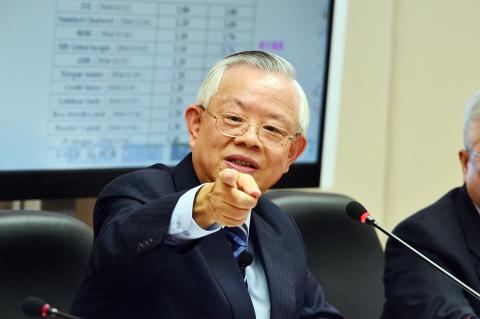The central bank yesterday kept its policy interest rates unchanged for the second consecutive quarter, saying the nation’s economy is experiencing stable growth, but the pace is not fast enough to merit a policy change.
“The board meeting decided to maintain a loose monetary policy stance as uncertainty over the global economy lingers,” Governor Perng Fai-nan (彭淮南) told a news conference in Taipei.
Benign inflation, forecast to rise to between 1 percent and 1.5 percent by different research institutes, means there is no urgency in ending the “status quo,” the central bank said.

Photo: Wang Yi-sung, Taipei Times
The decision means the bank’s discount rate remains at 1.375 percent, the collateralized loan rate at 1.75 percent and the unsecured loan rate at 3.625 percent.
Economists have said the central bank would maintain its rates for at least another six months, allowing the export-focused economy more room to recover from the slowdown in China and a mixed showing in the eurozone.
Mega Securities Co (兆豐證券) economist Lucas Lee (李志安) said the bank might keep its policy rates unchanged in the first half of next year because it needs time to judge US president-elect Donald Trump’s effect on the global economy.
“If Trump pushes for infrastructure investment, this will drive US economic growth, which in the short term would benefit the global economy,” Perng said.
However, Perng voiced concern over political uncertainty and growing protectionism.
Taiwanese trade would be damaged if the US adopts protectionist policies, he said.
Income gaps have widened amid the trend of globalization and several nations, notably the US, have indicated adjustment plans, but a reverse course might do more harm than good and Taiwan would suffer seriously given its deep participation in the global supply chain, he said.
As domestic companies have turned from capital-seekers to suppliers over the years, slowing business activity has created more idle funds and the central bank urged the government to use the nation’s excess savings to fund public construction works.
As of September, the life insurance industry had investment funds valued at NT$19 trillion (US$593 billion), with only NT$200.4 billion being used for special and public construction projects, Perng said, adding that assorted pension funds have another NT$3.9 trillion funds that should be better utilized.

The US dollar was trading at NT$29.7 at 10am today on the Taipei Foreign Exchange, as the New Taiwan dollar gained NT$1.364 from the previous close last week. The NT dollar continued to rise today, after surging 3.07 percent on Friday. After opening at NT$30.91, the NT dollar gained more than NT$1 in just 15 minutes, briefly passing the NT$30 mark. Before the US Department of the Treasury's semi-annual currency report came out, expectations that the NT dollar would keep rising were already building. The NT dollar on Friday closed at NT$31.064, up by NT$0.953 — a 3.07 percent single-day gain. Today,

‘SHORT TERM’: The local currency would likely remain strong in the near term, driven by anticipated US trade pressure, capital inflows and expectations of a US Fed rate cut The US dollar is expected to fall below NT$30 in the near term, as traders anticipate increased pressure from Washington for Taiwan to allow the New Taiwan dollar to appreciate, Cathay United Bank (國泰世華銀行) chief economist Lin Chi-chao (林啟超) said. Following a sharp drop in the greenback against the NT dollar on Friday, Lin told the Central News Agency that the local currency is likely to remain strong in the short term, driven in part by market psychology surrounding anticipated US policy pressure. On Friday, the US dollar fell NT$0.953, or 3.07 percent, closing at NT$31.064 — its lowest level since Jan.

The New Taiwan dollar and Taiwanese stocks surged on signs that trade tensions between the world’s top two economies might start easing and as US tech earnings boosted the outlook of the nation’s semiconductor exports. The NT dollar strengthened as much as 3.8 percent versus the US dollar to 30.815, the biggest intraday gain since January 2011, closing at NT$31.064. The benchmark TAIEX jumped 2.73 percent to outperform the region’s equity gauges. Outlook for global trade improved after China said it is assessing possible trade talks with the US, providing a boost for the nation’s currency and shares. As the NT dollar

The Financial Supervisory Commission (FSC) yesterday met with some of the nation’s largest insurance companies as a skyrocketing New Taiwan dollar piles pressure on their hundreds of billions of dollars in US bond investments. The commission has asked some life insurance firms, among the biggest Asian holders of US debt, to discuss how the rapidly strengthening NT dollar has impacted their operations, people familiar with the matter said. The meeting took place as the NT dollar jumped as much as 5 percent yesterday, its biggest intraday gain in more than three decades. The local currency surged as exporters rushed to